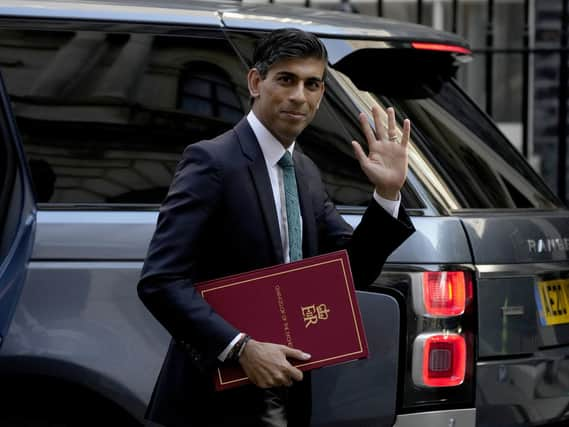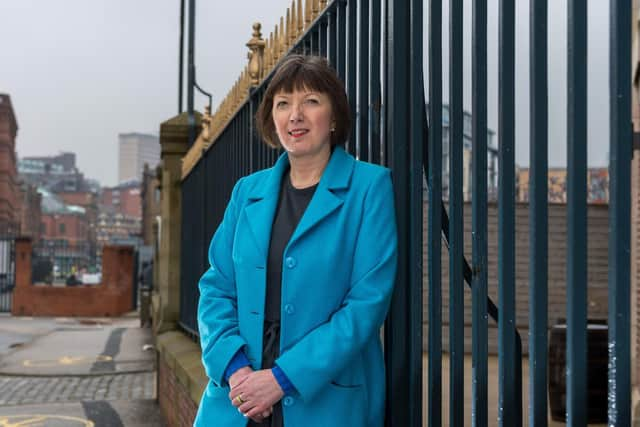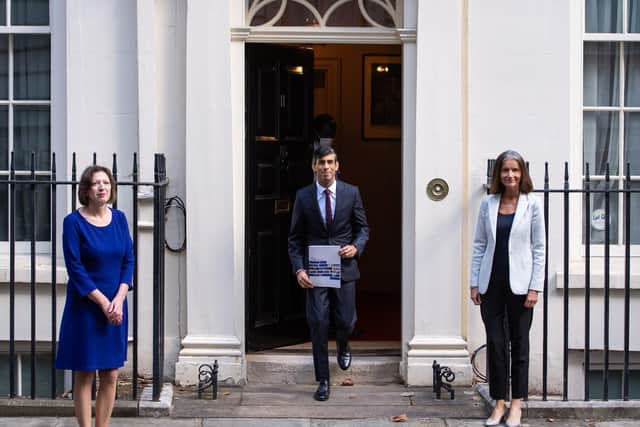Rishi Sunak 'not listening' to concerns over end of furlough and Universal Credit uplift, warns Frances O'Grady


The TUC general secretary told The Yorkshire Post that after praising Mr Sunak for bringing in the furlough scheme in March 2020 at the urging of unions, she was concerned the Chancellor and Richmond MP was not responding to concerns about the impact of the end of the furlough scheme, as well as other issues affecting workers such as the sick pay system, the forthcoming end of the £20-a-week Universal Credit uplift and now a National Insurance rise to pay for social care improvements.
Her comments came as the TUC published research warning low paid workers have borne the brunt of the financial impact of Covid.
Advertisement
Hide AdAdvertisement
Hide AdLow-income workers have had little or no option to work from home, no or low sick pay and reduced living standards, while better-off workers have enjoyed greater flexibility, financial stability and increased spending power, said the union organisation.


The union has called for an “economic reset” including an extension to the furlough scheme, the introduction of a permanent short-time working scheme to protect workers at times of economic change and cancelling the end of the Universal Credit uplift, which was introduced as a temporary measure at the start of the pandemic.
It comes after the TUC suggested at the weekend that social care improvements should be funded through increasing Capital Gains Tax instead of National Insurance.
The TUC also wants to see an increase to statutory sick pay, which stands at £96.35 a week, and from which more than two million low-paid workers – mostly women - are currently excluded because they do not earn enough to qualify.
Advertisement
Hide AdAdvertisement
Hide AdMs O’Grady said: “I’m not going to be coy about the fact that furlough was a union idea. We pushed that and persuaded the Chancellor to pick it up and I publicly gave him credit for listening. But he is not listening now and he needs to listen.


“Probably second only to the vaccine rollout, furlough was probably the most successful policy intervention this Government made. Exactly as we argued, it allowed firms to bounce back quicker, it protected working families, it protected our skills base which is also under strain in this country.
“They shouldn’t be so proud they can’t pick up good ideas wherever they come from.
“Our clear view is that on unfair funding for social care and a failure to fix the sick pay system - they should be listening.”
Advertisement
Hide AdAdvertisement
Hide AdRecent research from the Resolution Foundation predicted that the jobs market will have a “bumpy ride” when the Government scheme winds up at the end of the month.
The think tank says the programme has been an “overwhelming success”, protecting over 11 million jobs since March 2020, while an expected Covid-driven unemployment surge hasn’t materialised.
But the foundation added that with around 1.7 million workers still on furlough in late July, and with the rate at which people are coming off furlough stalling, the labour market remains “far from full health”.
Its report showed that if furlough rates continue to fall at the same pace as they did between April and June, when the economy was reopening, around 900,000 employees would be still be on the scheme when it closes.
Advertisement
Hide AdAdvertisement
Hide AdMs O’Grady said the situation has highlighted the need for further action amid fears of an increase in unemployment in sectors such as the arts and culture, food and hospitality.
“We have always been very clear that all of us would pay a very high price for mass unemployment. Those of us who lived through the 80s know it all too well - not just the misery it inflicts on families but it damages your economy and there is a scarring impact.
“It seems to me we have got about one million people left in furlough in industries that have a good future, are viable and in some case like aviation are strategically important. Let’s get around the table and make sure we don’t give up just as we are getting to the final hurdle. Those industries and jobs need support and the alternative of unemployment will cost us all a lot more in the long-run.
“I don’t care what we call it. It is the principle we need to step up and support these industries through that last stage. They have managed to get up off the floor, now they need to get off their knees. We need to support them to do that but we need to make it conditional on protecting jobs and pay packets.
Advertisement
Hide AdAdvertisement
Hide Ad“We know, as the Chancellor has admitted, yes furlough has cost money but it would have cost a hell of a lot more had we seen mass unemployment.”
Research by the TUC suggested that low-paid workers (those earning less than £15,000) are almost twice as likely as high-paid workers (those earning more than £50,000) to say they have cut back on spending since the pandemic began.
High earners are more than three times more likely than low-paid workers to expect to receive a pay rise in the next 12 months, said the report
The TUC stepped up its call for an increase to the £96.35 a week statutory sick pay, from which more than two million low-paid workers – mostly women – are excluded because they do not earn enough to qualify.
Advertisement
Hide AdAdvertisement
Hide AdThe end of the furlough scheme poses a serious threat to low-paid jobs, and combined with the Universal Credit cut will be a “hammer blow” for low-paid workers, pushing many further into hardship, ministers were warned.
Ms O’Grady added that new developments with the funding of social care would add to the pressure on low-paid workers.
“The TUC over the weekend put out a proposal saying before you start knocking on the doors of ordinary working people, let’s make sure taxes on wealth are fair because they certainly aren’t at the moment.
“You have got the private equity owner of a care home who is paying a lower rate of tax through capital gains than the low-paid young care worker delivering what we know is a vital service. Most decent people know that is not right.
Advertisement
Hide AdAdvertisement
Hide Ad“The Government has failed to address the issue of fairness. There are a lot of working people who are feeling hammered right now.
“There has been an awful lot of focus on people working from home but the majority of the workforce has worked right through this crisis, many of them delivering absolutely vital services from manufacturing to supermarkets to delivery drivers let alone NHS care and our public services.
"They are precisely the ones that are going to get hit by the Government’s proposals to fund social care through NICs rather than income tax or fair taxes on wealth.
“On top of that an awful lot of people are going to be really hit by the Government snatching back that £20 Universal Credit payment. Given not so long ago the TUC showed that one million children in poverty in this country have parents who are key workers - that is really going to hurt.
Advertisement
Hide AdAdvertisement
Hide Ad“The Government has got its priorities all wrong. Of course we all want to see a proper social care service and we want it properly funded, unlike the proposals on the table now. But we also want to see dignity for people who depend on that care and dignity for the people who deliver it.
“When the majority are on less than £10 an hour, something has gone badly wrong.”
Ms O’Grady was speaking ahead of the annual TUC Congress which is being held from Sunday.
A Treasury spokesperson responded: “The government has spent over £400 billion on support and has listened to industry, business, and public concerns throughout the pandemic.
Advertisement
Hide AdAdvertisement
Hide Ad“And it’s clear our Plan for Jobs is working, with nearly two million fewer people now expected to be out of work than was previously feared.
“We’re doubling down on this plan as the UK economy rebounds - focusing our support on giving people the skills and opportunities they need to succeed in the jobs of tomorrow through schemes including Kickstart, Restart and apprenticeships.”
Support The Yorkshire Post and become a subscriber today. Your subscription will help us to continue to bring quality news to the people of Yorkshire. In return, you'll see fewer ads on site, get free access to our app and receive exclusive members-only offers. Click here to subscribe.